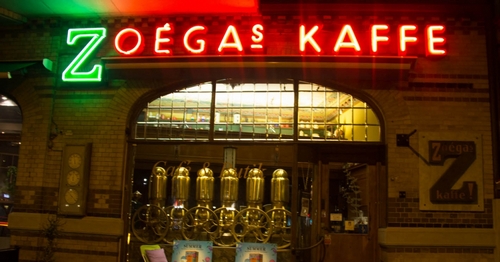IBM Food Trust will get part of that data from the sustainable product certification nonprofit the Rainforest Alliance and the rest from Nestlé. That marks a change of stance for the multinational food conglomerate, which had “limited” third party supply chain data in previous QR code traceable product campaigns.
Nestlé has added its Zoégas coffee brand to the IBM Food Trust blockchain and partnered with the Rainforest Alliance to bolster the coffee’s data traceability.
The food giant first announced the news in a blog post Monday. It will add QR codes to Zoégas’ “Summer 2020” coffee product packaging, sold in Sweden. When scanned, these codes will show consumers their beans’ journey from harvest to shelf, with documentation stored on IBM’s food tracing blockchain.
“Up until now we had been testing the best way to deploy IBM Food Trust internally alongside current systems”, a Nestlé spokesperson told CoinDesk. “We had to first build a robust knowledge and knowhow base on our deployment before linking our data to other organizations for an end to end view.”
“They certify many of our coffees, but they were also very open to innovation to bring this information to consumers in a different way”, the spokesperson said.
Nestlé said the collaboration did not pose much of a technical challenge as IBM Food Trust has become “fairly mature” and Rainforest Alliance was willing to invest time and effort to make it work.
Rainforest Alliance has experience tracing coffee products with blockchain systems as a client of the supply chain software firm ChainPoint. (ChainPoint is separate from the open source Chainpoint protocol). A spokesperson for the Alliance did not immediately respond to questions about whether ChainPoint was being used in the Nestlé collaboration.
Nestlé’s previous Northern European blockchain product pilots make it confident that Zoégas will “resonate” with the Swedes, the spokesperson said. The spokesperson declined to state how many consumers have scanned previous QR code campaigns, “but we have seen a great level of engagement so far.”

Netherlands May Block Foreign Crypto Firms Under Anti-Money Laundering Laws
Cryptocurrency entities based outside of the Netherlands may get the boot under new crypto regulations.
Following up a report by CoinDesk on the DNB’s recent registry mandate for cryptocurrency companies, DNB spokesperson Tobias Oudejans said the current legislation before the Dutch House of Representatives will not only force domestic companies to register with the central bank but that foreign entities will also not be allowed to conduct services within the country.
Foreign entities include all firms registered outside the of European Economic Zone, a block constituting most European countries.
When asked if foreign crypto companies will have to create offices within the Netherlands or Europe to gain access to the market, Oudejans gave no comment.
Oudejans said that the legislation, which addresses the fifth EU Anti-Money Laundering Directive (AMLD 5), is still under consideration. The central bank has already asked all Dutch crypto companies to register before the January 10 cut off date mandated by AMLD 5, however.
The legislation and central bank registration is based on anti-money laundering concerns. Like all financial firms, Oudejans said, crypto firms must register with the Dutch government. As a new industry, the regulations are very standard even if they seem draconian, he said.
Local crypto companies happy with regulation
A lack of clear regulation in the nascent Netherlands crypto market is an issue many Dutch crypto service providers are happy is being addressed, says one local crypto firm.
Crypto2Cash founder PJ Datema told CoinDesk bad actors won’t be able to live up to the DNB standards, helping mature the market with their exit.
“It’s a really nice step. I’m not saying they are embracing crypto. But we are finally moving forward after a long period of silence”, Datema said. “It’s good they are taking action. If we want the market to mature and the participants to evolve… you want anti-money laundering (AML) and proper know your customer (KYC)”, he continued.
How international–or even other European–firms will operate under the crypto laws being drafted has yet to be understood. Datema said the regulation is good for local companies and, from his interpretation, has the potential to block out competitors in Germany, France, and elsewhere.
For now, questions abound such as how the final legislation will look, how the DNB will enforce it, and how international players can operate within the Netherlands.
“With one parliament in Brussel, you would assume you would role out one set of rules for Europe”, Datema concluded.


